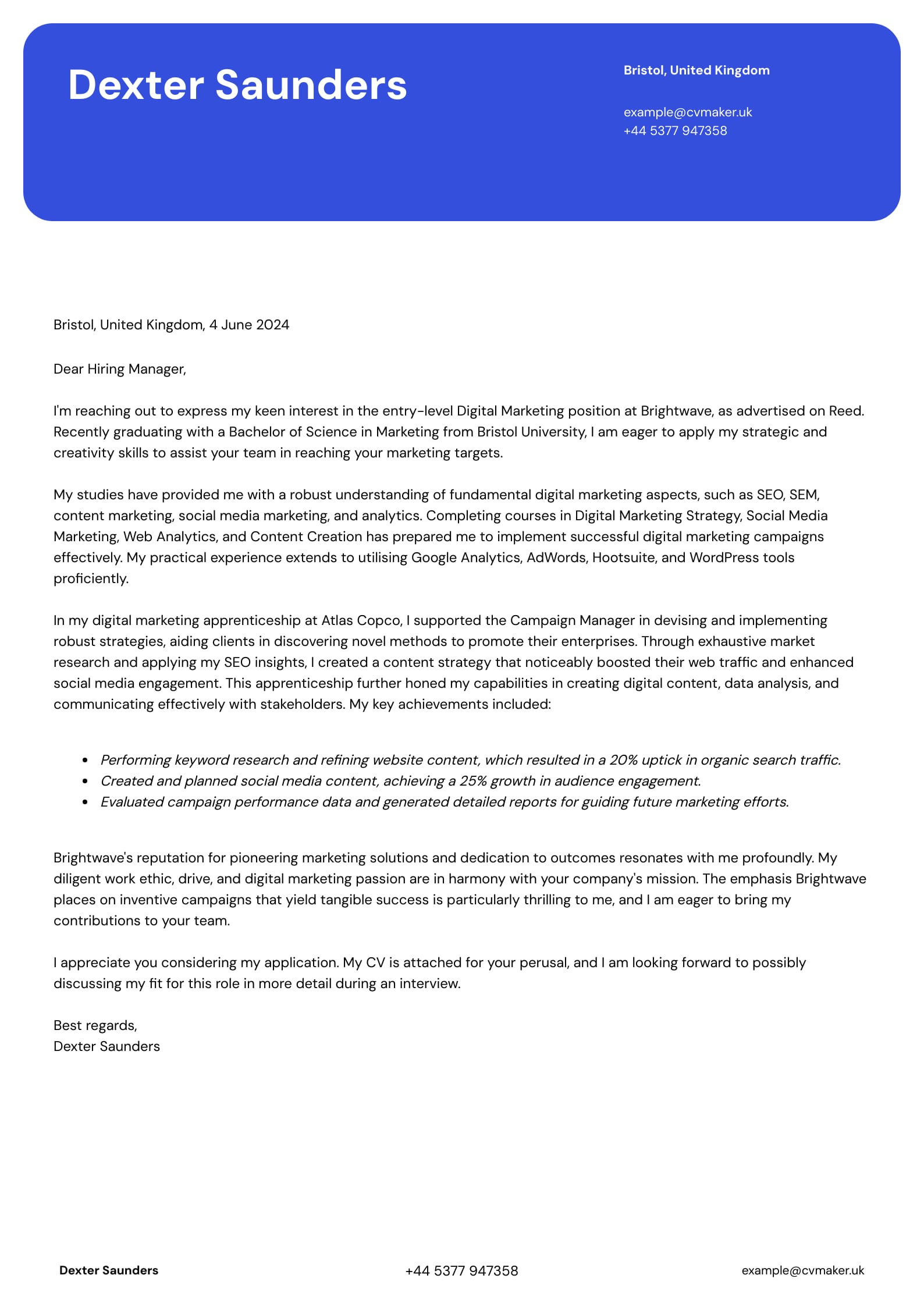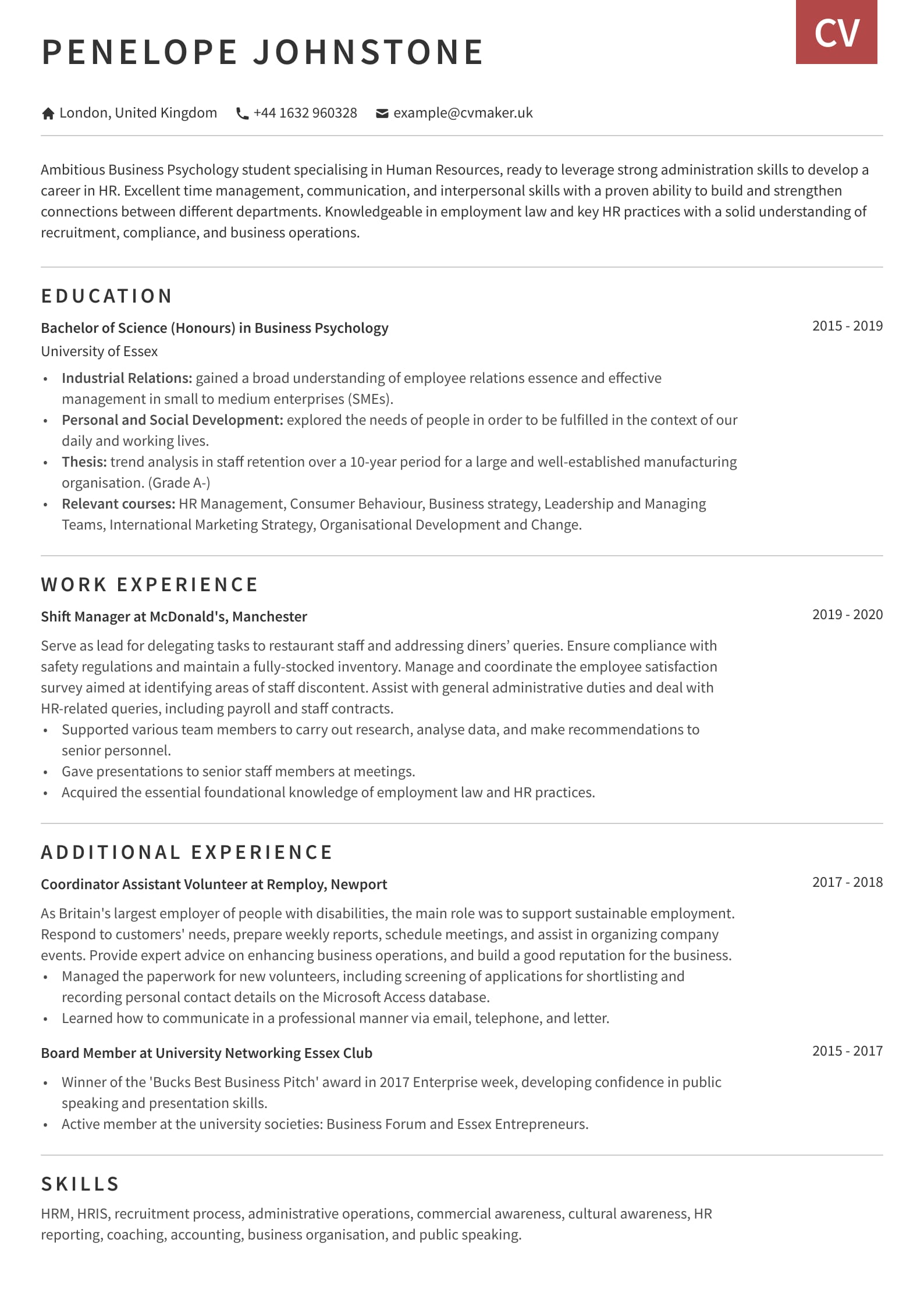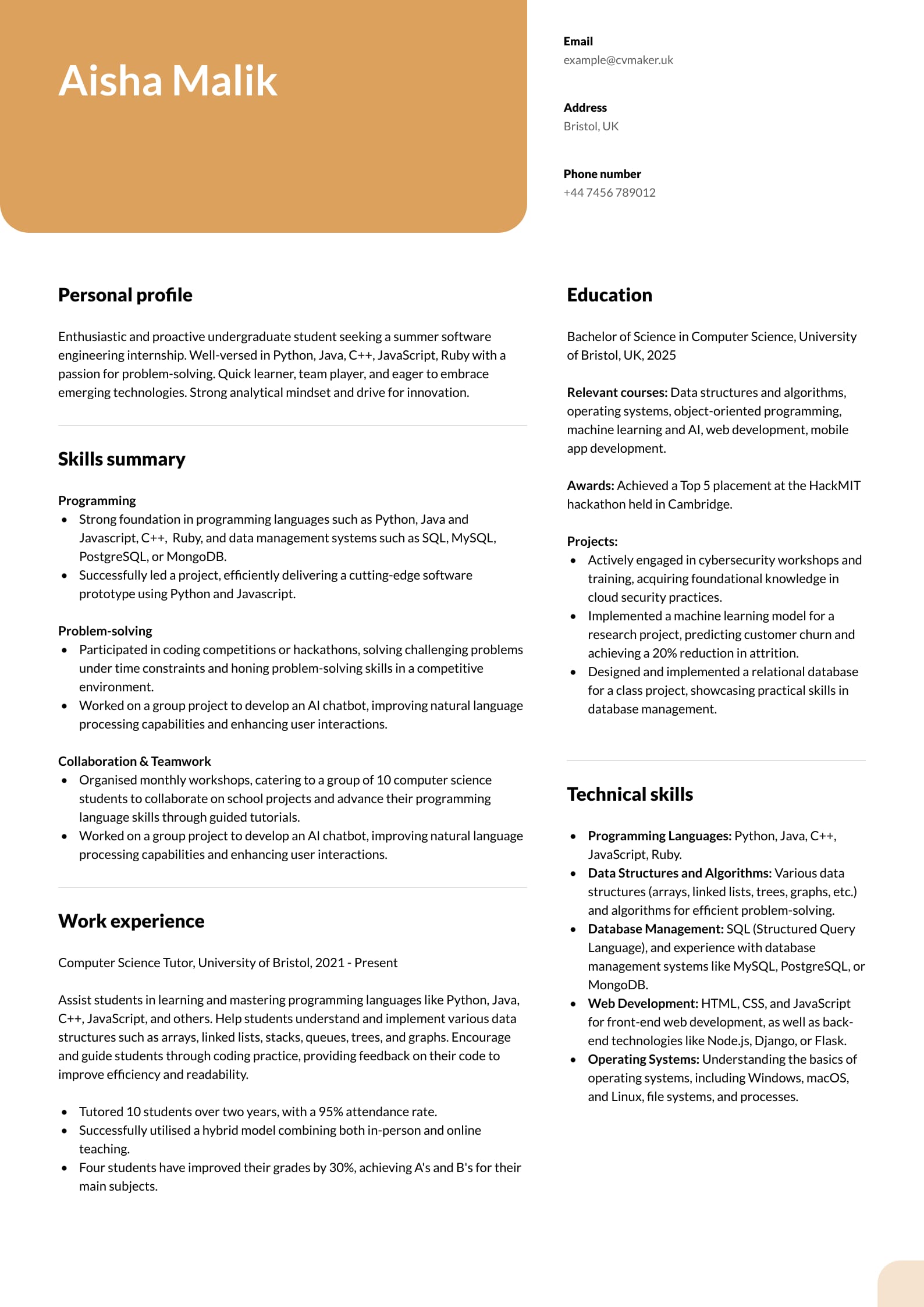
How to Write a Graduate CV: Step-by-Step Guide with Examples and Tips
If you're an ambitious graduate ready to embark on a career journey in the UK, abundant opportunities await across sectors such as hospitality, retail, IT, healthcare, finance, and others. This article is your roadmap, leading you through each step of the process and offering expert tips and examples to empower you in showcasing your qualifications, skills, and experiences.
To exceed employer expectations, don't overlook the crucial steps to crafting an applicant tracking systems (ATS)-friendly CV. Dive into our diverse CV examples and career tips, explaining what to include and how to format your CV to help you land the job you aspire to secure. For further professional insights, see our article on how to enter the workforce.
Let's begin!

Marketing Graduate CV example
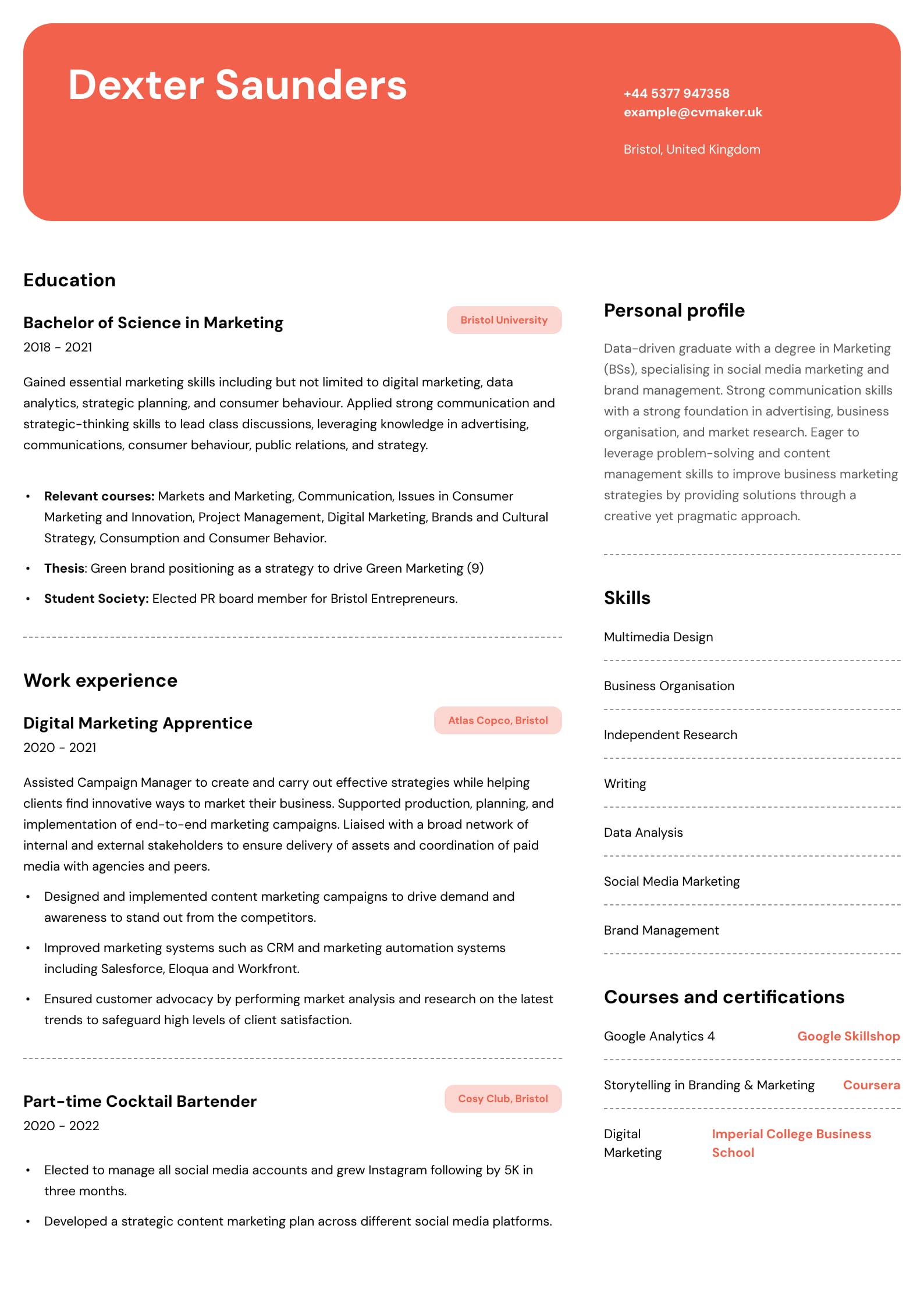
Download this CV example - Graduate CV
This marketing graduate CV sample features Dexter Saunders, a university graduate with a Bachelor of Science in Marketing, looking for his first job as a Junior Digital Marketing Assistant. During his studies, he gained relevant knowledge and skills in consumer behaviour, communications, and brand strategy. Education and additional experience are two core sections, demonstrating his qualifications and relevant experience. It is an effective tactic, showcasing transferable skills to recruiters and their applications to a corporate setting.
Accounting graduate CV example
 Learn more about writing a CV for an accountant job.
Learn more about writing a CV for an accountant job.
Engineering graduate CV example
 Learn more about how to write an engineering CV.
Learn more about how to write an engineering CV.
Looking for a matching graduate cover letter? Enhance your job application to set yourself up for success.
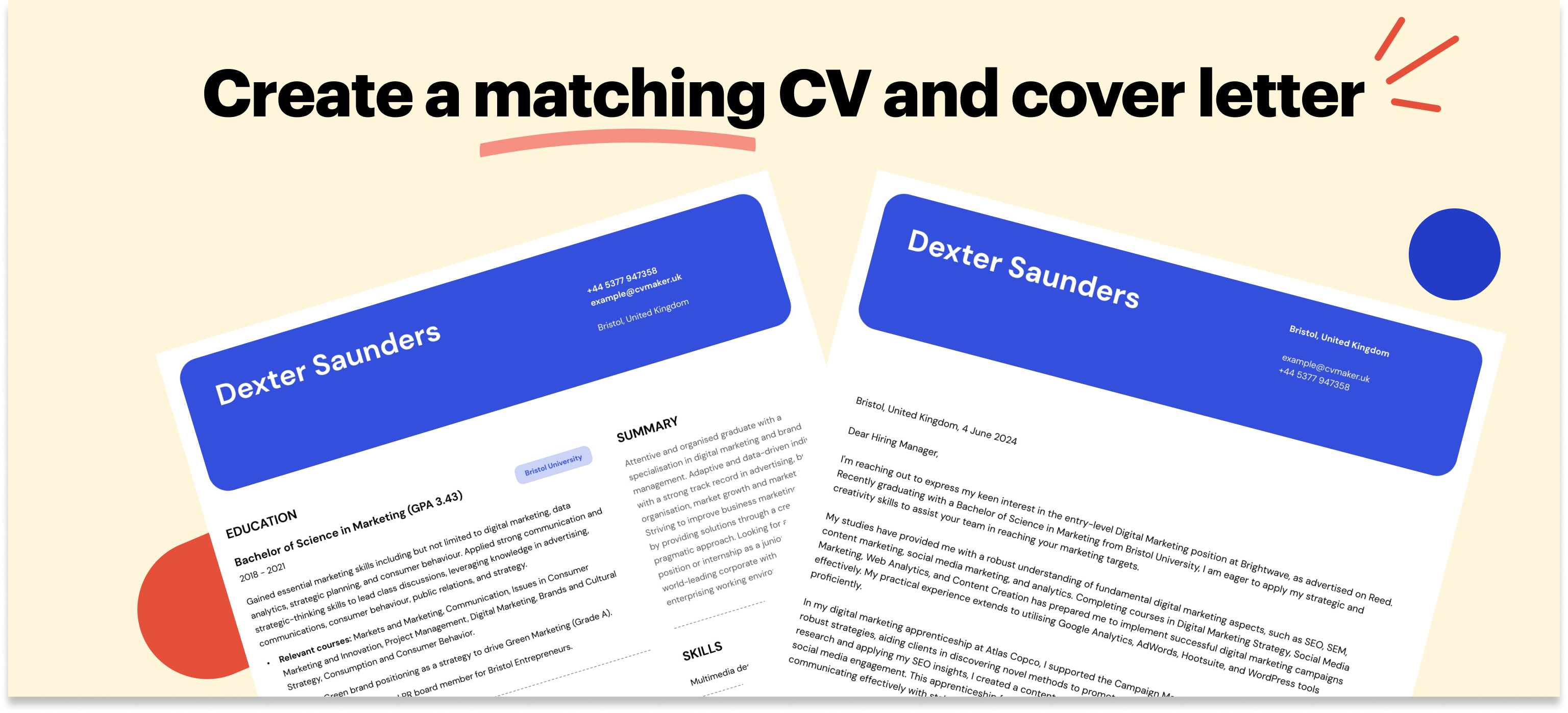
What to include in a graduate CV?
A CV looks different for everyone as it is unique to your situation. Start by carefully selecting keywords relevant to your entry-level position. Research the company culture and include only the necessary sections or details from the job description. This tactic shows you’re attentive to the company's needs and have a genuine interest in the field.
See below the must-have sections for your graduate CV example:
Personal information
Personal profile
Work experience (if applicable)
Education.
Skills
Consider the following additional sections, only if applicable:
Additional experience
Courses and certifications
Technical proficiencies
Languages
Hobbies and interests
References
Achievements.
Must-have CV sections
Personal profile
Skills section
Work experience
Education
Learn more about how to write a good CV.
We recommend creating a master CV to store all your information and then creating a new CV when applying for a specific job. See our article on the CV Writing Process: Master vs Job-Specific CV for more details.
How to write a personal profile for a graduate CV?
A personal profile or personal statement best describes your personality, what you want to achieve, and how your experience can contribute to the company's growth. In four to six lines, briefly demonstrate your strengths, key skills, and qualifications relevant to the particular position you're applying for. Remember to incorporate soft skills in this section and leave any technical or hard skills for a separate section called 'Skills'.
See our related article on the top soft skills for a CV to learn more.
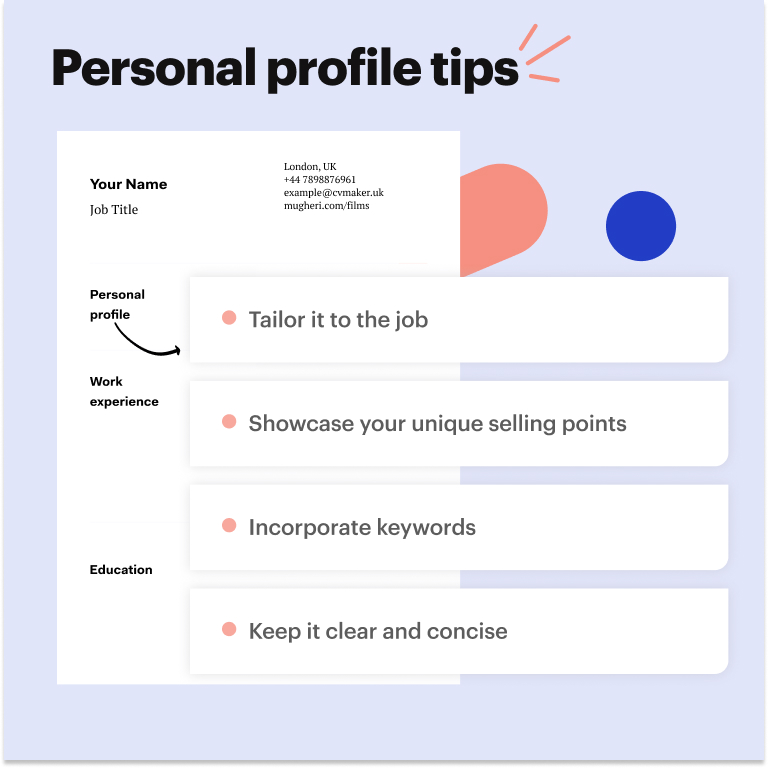
Additionally, mention your job target and career goals. Ensure you highlight soft skills such as pragmatic, attention to detail, and problem-solving in your personal profile. Create a separate section to expand on your hard skills, languages, or technical proficiencies.
For more information, refer to the article on how to write a personal profile on a CV.
Data Analyst Graduate CV Personal Profile Example
Result-driven Data Analyst graduate with strong knowledge of JavaScript, Python, Scala, SQL, and R. Knowledgable in machine learning and statistical tools. Adept at converting complex data into clean and easily understandable results. Demonstrated excellent communication and data visualisation skills.
See our data analyst CV example for more information.
Writer Graduate CV Personal Profile Example
Detail-orientated and creative English graduate, passionate about writing and technology. Strong editing skills gained through university courses, PR and communication assistance roles at student societies, and a part-time job in a bookshop. Independent yet outgoing technical writer with a strong work ethic and problem-solving skills.
Refer to our writer CV personal profile example to learn more.
Accounting Graduate CV Personal Profile Example
Attentive and enthusiastic graduate specialising in accounting and finance. Trained in governmental accounting procedures, financial statement preparation, budget analysis, and tax/audit policies. Experienced in QuickBooks, Odo, and custom accounting software.
How to add skills to a graduate CV?
When adding skills to your CV, ensure they are relevant to your job target. Place soft skills in the personal profile and hard skills under a separate section called 'Skills'. Be prepared to elaborate on these skills during interviews. Avoid mentioning skills, such as honest, good, bad, or funny, as these are irrelevant and don't add value to your CV.
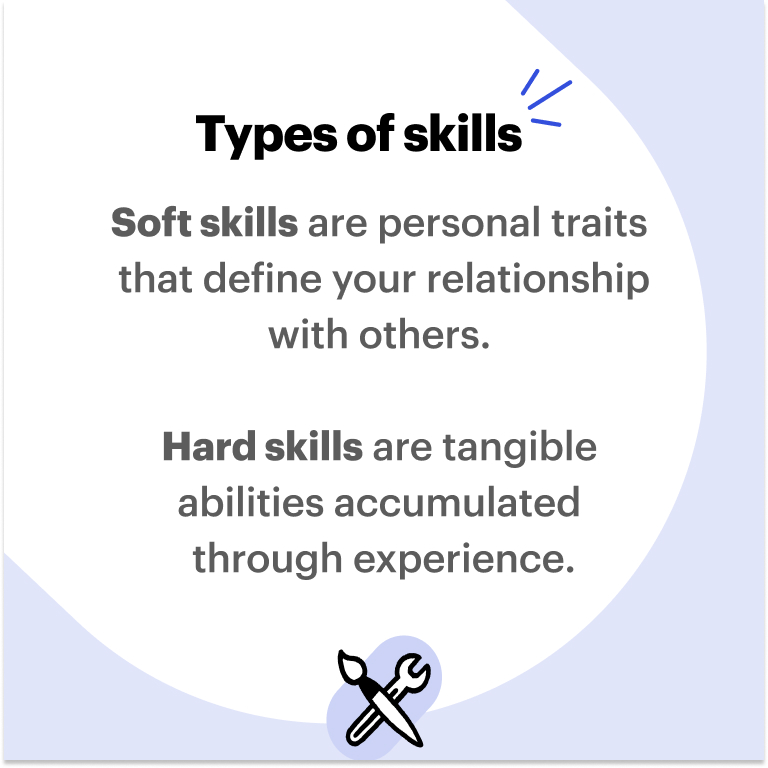
| Soft skills | Hard skills |
|---|---|
| Communication | Data Analysis |
| Creativity | Project Management |
| Problem-solving | Machine learning |
| Attentive | Social Media Management |
| Time Management | Graphic Design |
| Organisation | Customer Service |
| Teamwork | Sales |
For more details, check out this article on what skills to include on your CV.
How to include work experience on a graduate CV?
Work experience is the core of any professional CV, although you may not have much work experience as a recent graduate. The key is to keep it brief and clear, ideally no more than five to six lines per job. Start sentences with action verbs such as 'Developed' or 'Streamlined' to describe your duties and achievements. Include relevant experiences or transferrable skills gained from university projects or side jobs.
What should each work experience entry include?
Job title of current or previous role
Organisation name and location
Dates of employment (month/year)
A concise paragraph detailing your duties
Followed by 2–3 bullet points that highlight your key achievements or measurable impact.
Learn more about the work experience section in a CV.
If you have little to no experience or are seeking a career change, we advise you to follow a skills-based CV format to categorise your skills, explaining how they align with the company's goals.
Work experience examples for graduates:
Computer Science Graduate Apprentice, Codesmiths Solutions, 2020-2022
Worked with senior software developers and UX designers to develop and maintain a new e-commerce website for a fashion retailer. Learned and applied various programming languages, including Java, JavaScript, and Python. Designed and implemented database systems for storing and managing e-commerce information. Tested and debugged code to ensure the platforms were bug-free and secure.
Developed a new web application for e-commerce websites that increased user engagement by 20%.
Optimised a database query that improved application performance by 30%.
Identified and resolved a critical bug in the e-commerce websites that prevented the applications from crashing during Black Friday sales.
Part-time Junior Finance Analyst, Market Analytics Consultant, UK, 2015-2018
Assisted senior financial analysts in researching and analysing financial information for potential investment opportunities, such as analysing stock market trends and company financial statements. Assisted in creating financial models and reports to assess the profitability and risk of potential investments. Compiled and analysed market information to identify trends and opportunities for investment.
Successfully assisted in identifying a new investment opportunity in the renewable energy sector that generated a profit of 15% for the company.
Contributed to the creation of a financial model that accurately predicted the company's share price, which helped the company make informed investment decisions.
Compiled and analysed market information to make strategic investment decisions, such as diversifying the company's portfolio into new markets.
If you have little to no experience, consider adding the following experience to your CV:
Internships are perhaps the best substitute for your work experience because they clearly show how you applied your skills learned. Additionally, skills gained from an internship make you more valuable as an employee.
Traineeships and apprenticeships, like internships, bridge the gap between your academic, personal, and professional interests. It signals to a recruiter that you have the hard skills gained during your practical experience. You can look at it as an investment in your career.
Self-employment or freelancing are great additions to your CV. Similar to adding work experience, side jobs or internships on a CV, use a few lines and bullet points to describe both your duties and accomplishments.
How to write a graduate CV with no experience
Add a new section on your CV if you do not have work experience, which includes all your side activities. Examples of these activities include but are not limited to student societies, board memberships, and volunteering for non-profit organisations.
Additional tips for your graduate CV:
Apply with a matching cover letter.
Use concise, clear, and short language.
Focus on your most recent experience and qualifications
Carefully proofread your CV every time you send your application.
Use keywords and be persuasive from the job post.
Demonstrate how academic skills translate to the professional realm.
Consider a skills-based CV if you have little to no experience.
Seek job shadowing or internships for practical exposure.
Focus on your extracurricular activities, training, and part-time jobs for a well-rounded profile.
Example of work experience for graduates with no experience:
Engineering Graduate Intern, Synergy Engineering Consultants, 2020-2023
Assisted senior engineers in designing and developing new projects (projects), including the design of a new school building. Conducted research and testing on new building materials and technologies.Created prototypes and test models of new designs (designs) using computer-aided design (CAD) software. Prepared technical reports and presentations for project reviews and to clients.
Successfully designed and prototyped a new lightweight structural component for the school building (project), which reduced the weight of the building by 10%.
Developed a new procedure for testing the fire resistance of new building materials.
Prepared a comprehensive technical report that was used to secure a new contract for the company to design and build a new hospital.
If you have little to no experience, create a separate section section called 'Additional experience' where you could include the following information:
Side jobs: showcase that you can multitask and have the willingness or drive to work. Examples of side jobs could include waitressing, bartending, or au pairing.
Teaching Assistant or Tutor provide academic assistance to students outside of a classroom setting. Through this experience, you gain valuable teaching skills such as problem-solving, leadership, communication, and adaptability for each student. Tutors tend to be patient, motivated, and enthusiastic about their subjects.
Student societies: if you were actively involved in your student community at your university, it shows that you are willing to help others or go above and beyond what is required of you.
Volunteering activities do not directly belong to the work experience section because, generally, you’re not hired or paid by an employer. It depends on what kind of volunteering experience you have, of course, but in most cases, it is safer to keep it in this section. Volunteering is still a useful experience that allows you to gain practical skills while working with diverse people in one team.
For more details, refer to the article hobbies and interests on a CV.
How to add education to a graduate CV
This section is a must-have for your CV, where you can elaborate on your qualifications, degrees, and additional courses you have undertaken. Remember, while some recruiters don’t require you to possess a specific degree, others do. Carefully review the job requirements to see if you’re eligible for your desired job position.
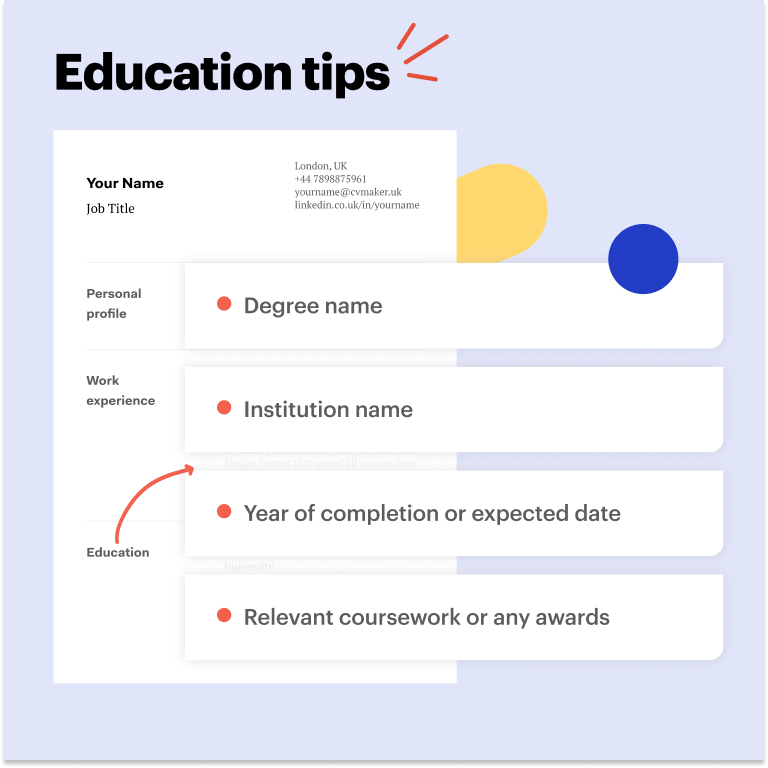
Start by writing a short description of your degree and then use bullet points to list your relevant coursework or other achievements like projects. If you want to learn more about this, the article on how to improve your CV elaborates more on this.
Examples of education:
UK GCSEs
[n] GCSEs (including Mathematics and English)
[School Name], [School Location], [Years Attended]
Hillside High School, Manchester, UK, 2014 - 2016
10 GCSEs in grades A–C, including Mathematics and English
A Levels
[A Level] in [Subject 1], [Subject 2], [Subject 3]
[School Name], [School Location], [Years Attended]
Biology (A) Geography (B) Economics (C)
Manchester College, Manchester, UK, 2016 - 2018
BTEC
BTEC [Level] [Qualification] in [Subject Name]
[Institution Name], [School Location], [Years Attended]
BTEC Level 3 Extended Diploma in Information Technology
Hillside High School, Manchester, UK, 2014-2016
NVQ
NVQ [Level] in [Subject Name]
[Institution Name], [Location], [Years Attended]
NVQ Level 2 in Hospitality and Catering
Manchester College, Manchester, UK, 2014-2016
Diploma
[Diploma name] and [Level]
[Institution Name], [Location], [Years Attended]
Level 2 Diploma in Early Childhood Education, Manchester College, Manchester, 2016 – 2017
Highlighting projects on your CV provides recruiters with examples of your transferable skills applied in a non-academic setting. Adding them to your CV illustrates your ability to commit time, lead, initiate, or manage projects over a long period.
What courses and certificates to choose for a graduate CV?
Courses and certificates are essential in showcasing your potential, especially when you're at the early stages of your career and may lack work experience. This section adds depth by complementing your hard skills and work experience sections. Remember, brevity is key – aim for one to two lines per course to impress your recruiters.
If you aim for a specific industry, consider enrolling in specific courses to improve your knowledge and skills. This highlights your commitment to continuous learning and distinguishes you from other candidates.
Examples of courses for graduates:
Social Media Management, Hootsuite Academy, 2022
Graphic Design Basics, Adobe Creative Cloud, 2021
Entrepreneurship Essentials, Coursera, 2020
Public Speaking Mastery, Toastmasters International, 2019
Customer Service Fundamentals, LinkedIn Learning, 2018
Business Ethics and Compliance, FutureLearn, 2017
To discover suitable courses, explore diverse graduate schemes with the National Careers Service or check out a graduate job finder on Prospects.
If you’re looking for accredited online courses as a fresh graduate, consider using one of the course providers below.
To learn more, refer to our blog article on how to list courses and certificates on a CV.
Key takeaways
Ultimately, a successful CV hinges on a strategic approach, focusing on specific roles while showcasing relevant work experiences and transferable skills. Applying what you've learned in this guide gives more insight needed to navigate this ever-changing job market and attain your career goals!
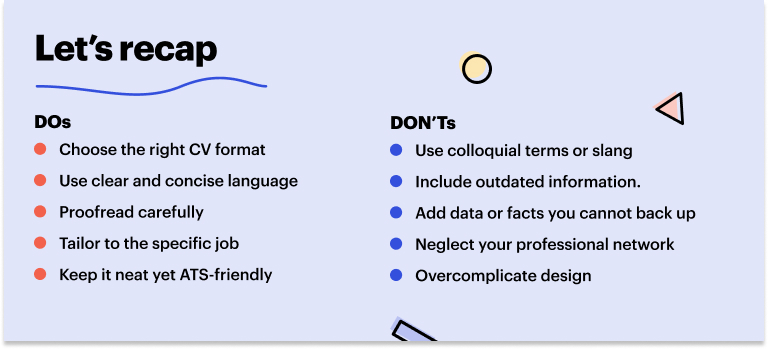
Next steps?
We are an innovative job-tech company with a built-in CV builder tool that supports over 25 languages. To help you achieve your career goals, our team has designed over 20 professional CV and cover letter templates for you to draw inspiration. You can also use professional cover letters, manage your applications and even receive relevant job recommendations. All in one platform.

FAQ
What should a graduate CV look like?
A strong graduate CV is tailored to the specific role, emphasising relevant skills and motivation. Keep it brief and preferably no more than 2 pages long. Highlight relevant work experiences, such as internships or apprenticeships, and showcase transferable skills gained from your side jobs, volunteer roles, or university projects. Clearly outline academic and work-related skills to demonstrate your potential to achieve high results within an organisation.
What is the best font for a graduate CV?
Use a consistent professional font between the sizes 11 and 12. Most importantly, ensure it is easy to read, as recruiters, on average, only spend a few seconds assessing your application. See our list of the top five fonts below:
Top 5 CV fonts for a graduate CV:
Calibri
Cambria
Georgia
Helvetica
Arial
For more information, refer to our related blog article on choosing the best for your CV.
How to format your graduate CV?
Opt for the widely recognised reverse-chronological format. Submit your CV in PDF or Doc to make sure it is compatible across devices while maintaining a clear format. Minimise white space, exclude irrelevant sections and double-check details for consistency.
If you have little to no experience, it's best to use a skills-based format, allowing you to elaborate on your transferrable skills gained from projects, side activities, or work experience.
How long should my graduate CV be?
Your CV must be 1-2 pages long. Ideally, it is better to keep everything on one page. Try to avoid using lengthy and vague words. Note that two or more pages long CVs are not recommended unless you have many years of relevant experience or are applying for a job in academia or STEM industries.
Refer to the blog article on how long should a CV be for more information.
Do your university grades matter to employers in UK?
In specific roles, especially those requiring in-depth knowledge, grades do matter - consider jobs asking for a 2:1 or a first-class degree. Yet, it's crucial to recognise that practical experience, such as internships or group projects, often holds more sway on your CV. While employers may consider your university's reputation and final grades, highlighting practical skills and specific experiences, like successfully managing a team project or applying coursework to real-world scenarios, can truly distinguish you in a competitive job market.
